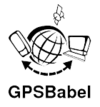GPSBabel
GPSBabel is a cross-platform, free software to transfer routes, tracks, and waypoint data to and from consumer GPS units, and to convert between over a hundred types of GPS data formats.[1] It has a command-line interface and a graphical interface for Windows, MacOS, and Linux users.
 | |
| Original author(s) | Robert Lipe |
|---|---|
| Developer(s) | Robert Lipe and community |
| Initial release | October 2, 2002 |
| Stable release | 1.7.0
/ July 6, 2020 |
| Repository | |
| Written in | C++ |
| Operating system | Cross-platform |
| Type | GPS |
| License | GPL |
| Website | https://www.gpsbabel.org |
GPSBabel is part of many Linux distributions including Debian GNU/Linux and Fedora, and also part of the Fink and Homebrew systems for getting Unix software on Mac OS X. The most current, official version is always on the official GPSBabel download site.
Applications
Many contributors to OpenStreetMap use GPSBabel to convert GPS track data from proprietary formats to the GPX format OpenStreetMap requires.
GPSBabel is popular in the Geocaching community because it enables people with incompatible GPS units to share data.
Geographic information system (GIS) applications such as QGIS and Grass use GPSBabel for many import and export operations and processing.
Photographers frequently use GPSBabel for geotagging images, associating location with photographs. This relies on GPS data loggers, either external or internal to the camera.
GPSBabel enables owners of many different brands of GPS units to view their GPS data in several popular consumer map programs, such as Google Earth and Microsoft Streets & Trips.
Notes
References
- "GPS Running Log", Make Magazine, vol. 7, pp. 117–118.
Further reading
- Erle, Schuyler; Gibson, Rich; Walsh, Jo (2005). Mapping Hacks: Tips & Tools for Electronic Cartography. O'Reilly Media. ISBN 978-0-596-00703-4.
- McNamara, Joel (2004). GPS For Dummies. For Dummies. ISBN 978-0-7645-6933-3.
External links
- Official website

- Gebabbel Qt4.3 frontend
- Prune can also act as a frontend